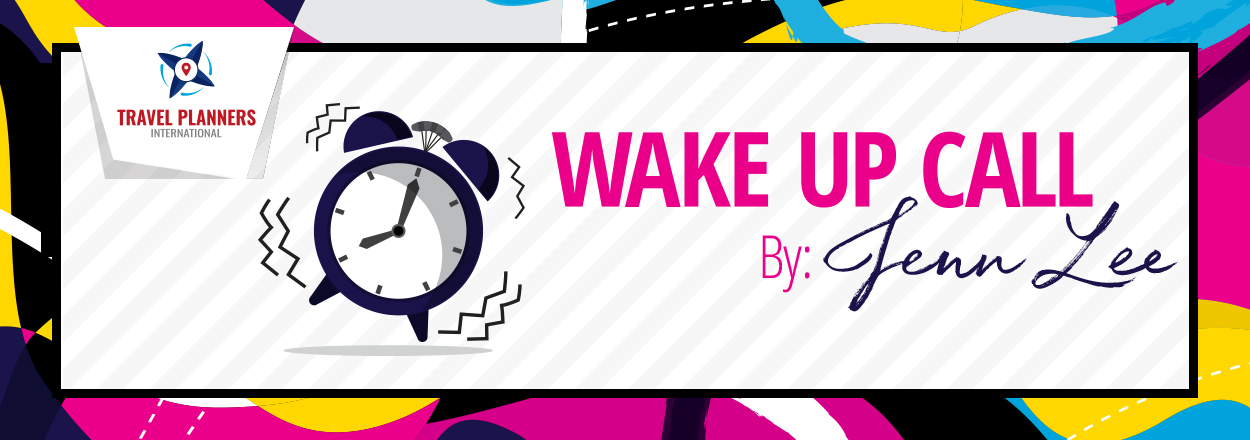
Travel insights from Jenn Lee, VP of Sales and Marketing for Travel Planners International
Increase Your Sales By Using These 5 Word Swaps
It is a truth universally acknowledged that people buy on emotion, but justify logically. It’s why every (good) marketer and advertiser understands and wields the power of words to sell us on just about everything. And how could it not? Words elicit emotion, are inherently visual and hold so much meaning. Are you doing the same?
As travel advisors, a large part of your job is to sell. Sell your clients on that dream cruise, tour or destination. It’s not just about closing the sale, but also guiding your clients down the path that will convince them to book with you. The right word used during the sales consultation process marks the vast difference between crafting the perfect experience (and sale!) with ease, and struggling through the process with friction and disappointment.
Luckily for you, you don’t have to memorize a whole thesaurus to craft the right experience. Below, I’ll share 5 easy word swaps that are proven to effectively increase your bottom line. Plus, they’re natural sounding so you won’t come off as a pushy salesman.
Use: What is MOTIVATING you…?
Instead of: What is the reason for your vacation?
This is my absolute favorite sales hack because this question wields so much power. As part of the qualification process, I’m sure you’re already asking your clients or prospects the reason behind their travels. Trash whatever you used before and replace it with: what is motivating you to travel? Feel free to make it specific to them (…to go to Paris/China, etc.) too. This question will truly reveal their whole story.
When you ask them close-ended questions like “Is this for a special occasion?”, you’ll only learn about the special occasion and not the true emotional reason they’re going. As an example, your new client told you that they’re celebrating her parents’ 50th wedding anniversary but the true emotional motivator is that her father was recently diagnosed with early onset dementia and she fears this is the last time they can travel abroad together. Two total different answers, right? When you have the full story, you can properly curate the perfect vacation for your client.
Use: Does that sound about RIGHT?
Instead of: What is your budget? Or is this in your budget?
While it doesn’t appear to seem like a logical swap, let me paint you a picture. Your new client has already disclosed her emotional motivator and now you’re going through options. You discover a European river cruise is best for her parents, that a suite is definitely preferred, and because comfort is valued, they want to fly business class. While you’re nailing down these details, mentally calculate how much each item costs. At the end of the conversation, recap everything you discussed (the river cruise, suite, flights, etc), give an estimate, and close with, “Does the sound about right?”.
In my opinion, you never ask your clients about their money. Instead, you curate and craft the experience your clients want based on their motivational factor and other qualifying questions. By asking this question and avoiding the word “budget”, you’re setting your clients up for an easier conversation to have “logically”. Plus, if your estimate is out of their budget, it’s easier for them to tell you “that’s not right” than “I don’t have that kind of money.”
Use: Next thing WE need to do…
Instead of: What I need from you is…
Many people get nervous when going through the booking process. So instead of asking your clients what you need from them (i.e: their credit card), turn it into something you’re both doing together. “The next thing we need to do is reserve this suite.” The more often you use “we”, the more connected they’ll feel to you. It’s a solid reminder that you’re on the journey with them.
Use: Yes, AND…
Instead of: Yes/No
This great tip I learned from an improv class. The “yes, and…” strategy helps with brainstorm and keeps the energy flowing. You use it in place of “no” because it doesn’t stop your train of thought. The same applies to the sales process. Now that you’ve reminded your client that you’re on this journey together, try incorporating “yes, and…”.
If your clients suggest they want to swim with dolphins, you respond with “yes and tomorrow you can go parasailing”. The more you incorporate “yes, and…” into your dialogue, you’re creating the full picture and experience for your client. Remember, people buy on emotion, then justify logically.
Use: What if WE…
Instead of: Dismissing objections
Here’s another way to incorporate “we”. In a perfect world, there would be no objections. Unfortunately, we’re not there yet. If your client objects to any thing you’ve suggested or backs out entirely, don’t dismiss their objections or take it as a loss. Meet their concerns with solutions. The key here is to phrase it like this: “What if we looked at another cruise line?”. Again, you want your clients to feel connected to you while they’re on this journey. Nothing drives that point better by using “we”.
And those are my five simple word swaps! Even if you start with one or two of the aforementioned swaps into your daily conversations with your clients, you’ll notice a difference in your sales.
Want to learn more about these proven selling tactics? Check out a webinar I did a few weeks on this very subject! In it, I go more in-depth on each point, share various examples, and provide some recommended reading material. You can listen to it by clicking here.
Have any other word swaps that have made a positive impact on your sales? Share them with me in the comment section below!
About the Author

You May Also Like
Erwing Hernandez Named Senior Vice President of Travel Planners International
MAITLAND, FL - Travel Planners International, Inc. has announced that Erwing Hernandez has been named Senior Vice President of Travel Planners International. Hernandez, formerly the Vice President of Operations, has been with TPI for 23 years and will assume the role immediately. He will be reportin
3 Solutions to Beating Stress for the Small Business Owner
The other day, while scrolling through my Facebook feed, I saw a TPI (Travel Planners International) travel advisor stressing over her client’s trip. Nothing wrong had happened but she was still nervous about how well it was going. Other TPI agents flooded her comments section, echoing her sentiment
10 Cruising Tips from Travel Agents
New cruisers, experienced cruisers, hesitant cruisers – keep reading to get the inside scoop on cruises from the industry's best resource: travel agents. Have a passport! Even if the cruise is a closed loop (starts and ends in U.S.), you cannot get back to the U.S. easily if you have an issue in an
The Most Important Business Plan You’re Probably Missing
As a business owner, not having a “plan” can lead you to some serious pitfalls. It’s why you probably have a general business model as well as a marketing and profitability plan. However, what happens when you can’t run your business anymore? Do you have a succession plan in place? Do you know how t